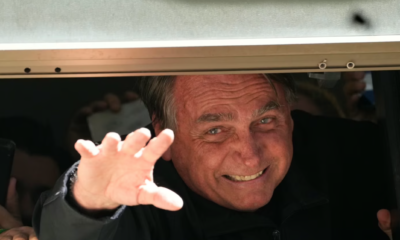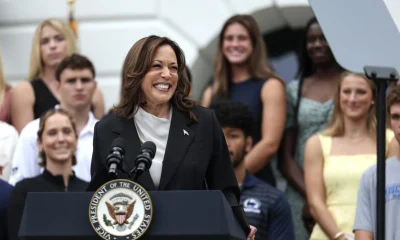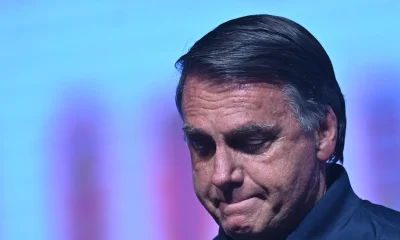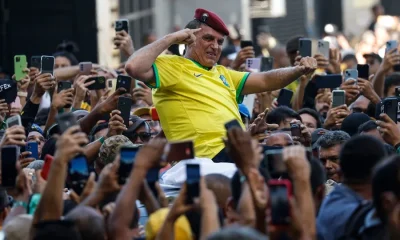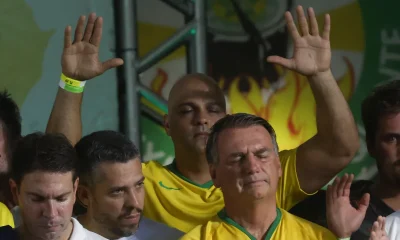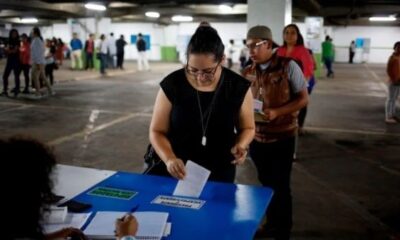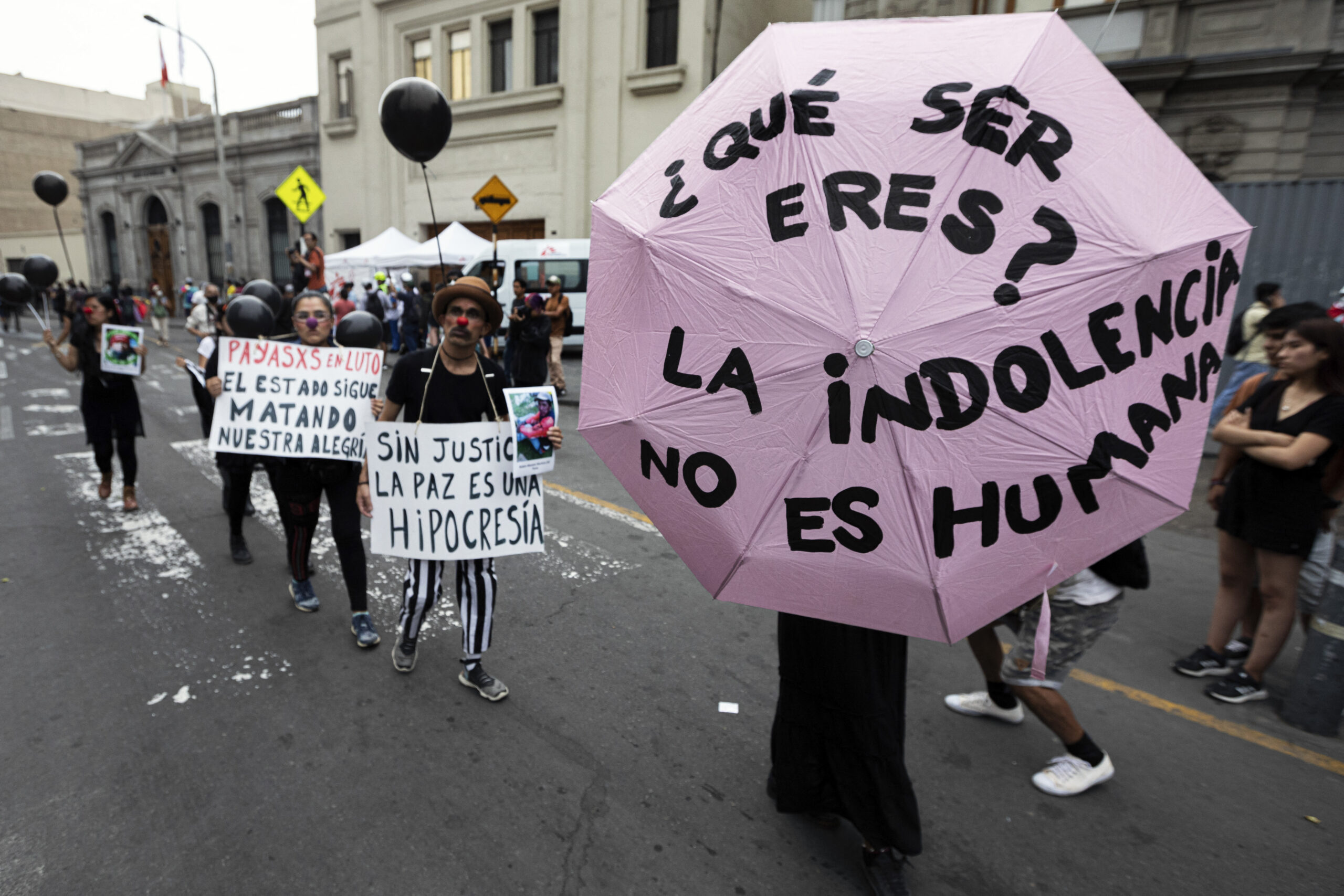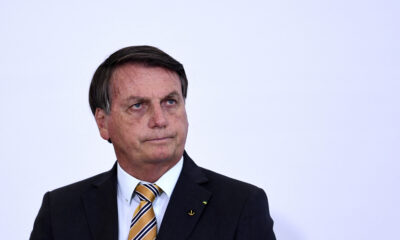International
Brazil’s Bolsonaro still silent on election loss to Lula
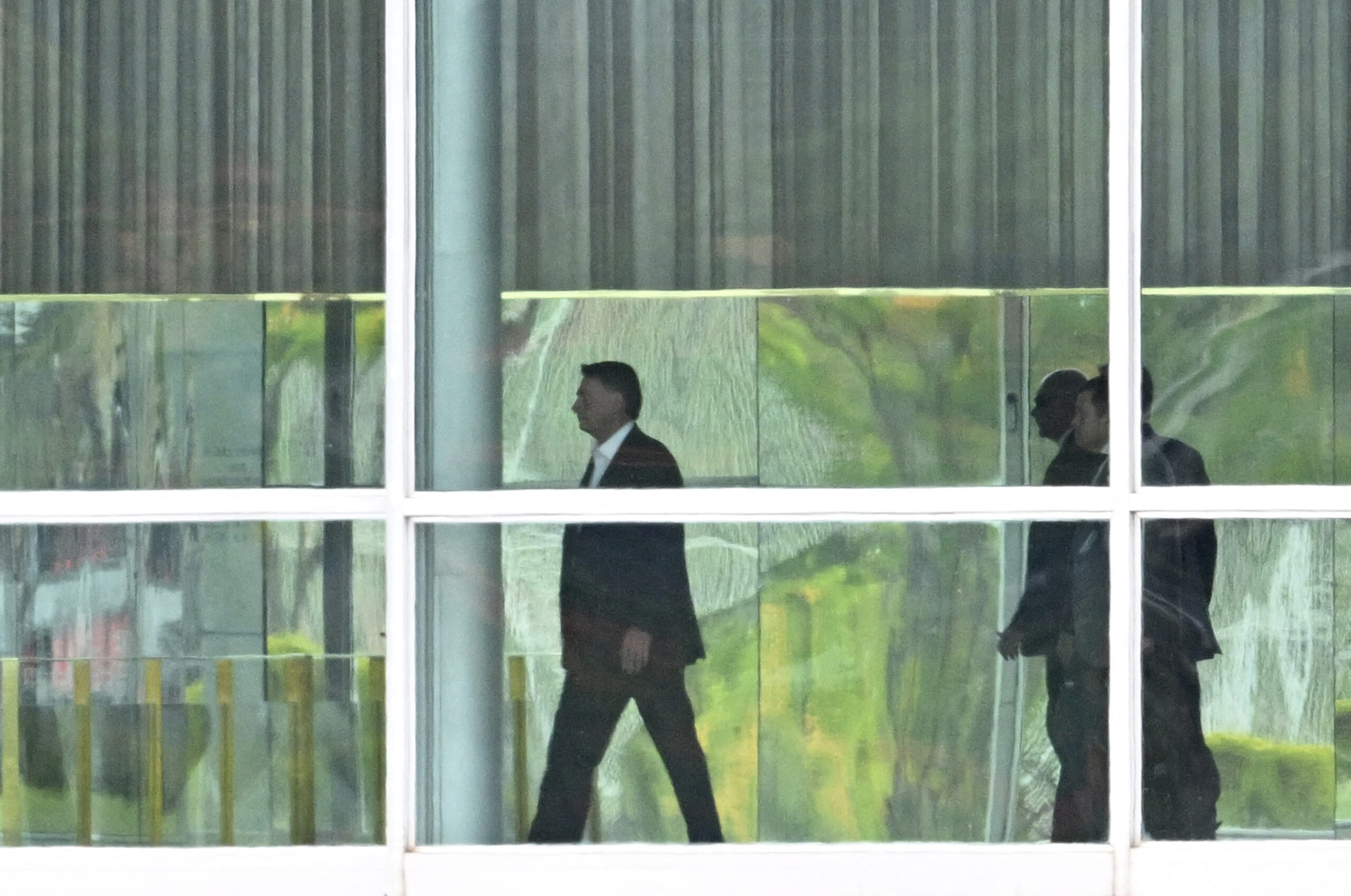
| By AFP | Fran Blandy and Joshua Howat Berger |
Brazil’s far-right President Jair Bolsonaro maintained an increasingly loud silence Monday after his election defeat, failing to acknowledge his loss to veteran leftist Luiz Inacio Lula da Silva — who faces a tough to-do list.
Twenty-four hours after the close of voting in Sunday’s deeply polarizing runoff election, Bolsonaro had still not recognized the outcome — raising fears he could try to challenge it, with potentially turbulent results for the country.
Charismatic but tarnished ex-president Lula defeated Bolsonaro by the narrowest margin in Brazil’s modern history — 50.9 percent to 49.1 percent — to return for an unprecedented third term at the helm of Latin America’s biggest economy from January 1.
After a dirty, divisive campaign that left the country of 215 million people split in two, the 77-year-old leftist icon now faces a laundry list of challenges, including a struggling economy, rampant destruction of the Amazon rainforest, and a powerful and angry far-right.
But first, there is the giant question mark over whether Bolsonaro will accept defeat.
The far-right president has not spoken publicly or on his beloved social media accounts since the result was announced, after months of alleging fraud in the electoral system and a conspiracy against him.
The transition period got off to a tense start as pro-Bolsonaro truckers and protesters blocked highways in at least 11 states across the country Monday, burning tires and parking vehicles in the middle of the road to halt traffic.
Wearing the yellow and green of the Brazilian flag — which the outgoing president has adopted as his own — the protesters wielded pro-Bolsonaro signs and sang the national anthem, before gradually being broken up by the authorities.
Markets were volatile, but reacted favorably overall to the election: after dipping slightly, stocks were up 1.3 percent in afternoon trading in Sao Paulo, and the Brazilian real gained more than two percent against the dollar.
Hope for climate fight
Lula, who vowed in his victory speech to restore Brazil’s damaged image on the international stage, started with phone calls with US President Joe Biden, France’s Emmanuel Macron, Germany’s Olaf Scholz, UN Secretary General Antonio Guterres and others, plus a meeting with Argentine President Alberto Fernandez in Sao Paulo, advisers said.
Biden and Lula “committed to continue working as partners to address common challenges, including combatting climate change, safeguarding food security, promoting inclusion and democracy, and managing regional migration,” the White House said.
There was meanwhile radio silence from Bolsonaro, whose absence sparked jokes online.
One meme that went viral earlier Monday featured a picture of a vaguely disoriented-looking Bolsonaro, with the caption, “Missing: elderly man, very talkative, has not been heard from in 12 hours.”
First Lady Michelle Bolsonaro meanwhile denied swirling rumors of a post-election marital crisis, after she and her husband reportedly stopped following each other on social media.
AFP journalists said Bolsonaro left his official residence without comment Monday morning for the presidential offices, where he was photographed walking down a corridor with a grim face.
Officials there said the former army captain was meeting with cabinet ministers.
There are fears Bolsonaro, 67, could attempt a Brazilian version of the US Capitol riots which rocked that country after his political role model, former US president Donald Trump, refused to accept his election defeat in 2020.
But the Brazilian leader may find himself isolated.
Some key Bolsonaro allies have publicly recognized his loss, including the powerful speaker of the lower house of Congress, Arthur Lira.
And international congratulations for Lula poured in from the US, China, India, France, Britain, South Africa and numerous others.
The European Union’s leadership voiced hope the result would lead to ratification of a trade deal with South American bloc Mercosur, long stalled over concerns about rampant deforestation in the Amazon under Bolsonaro.
Norway announced it would resume paying nearly $500 million in aid for protecting the world’s biggest rainforest, which it halted in 2019 over Bolsonaro’s policies.
“We had a head-on collision with Bolsonaro, whose approach was diametrically opposed (to Lula’s) when it came to deforestation,” Norwegian Environment Minister Espen Barth Eide told AFP.
Deep divisions
Lula, who previously led Brazil from 2003 to 2010, criticized his nemesis Sunday night for not acknowledging the result.
“Anyplace else in the world, the defeated president would have called me to recognize his defeat,” he said in his victory speech to a euphoric sea of red-clad supporters in Sao Paulo.
The ex-metalworker, making his return from controversial, since-quashed corruption charges that sent him to prison for 18 months, vowed to work for “peace and unity” in the divided nation.
Easier said than done, according to political analysts.
“It was a very narrow victory (that left) half the population unhappy,” said political scientist Leandro Consentino of Insper university in Sao Paulo.
“Lula will have to show a lot of political skill to pacify the country.”
International
Trump Floats “Friendly Takeover” of Cuba Amid Rising Tensions

U.S. President Donald Trump said Friday that his administration is considering what he described as a “friendly takeover” of Cuba, as Washington continues to increase pressure on the island’s communist government.
“The Cuban government is talking to us and they have very serious problems, as you know. They have no money, they have nothing at this moment, but they are talking to us and maybe we will see a friendly takeover of Cuba,” Trump told reporters as he departed the White House for a trip to Texas.
Earlier in the week, U.S. Secretary of State Marco Rubio said Cuba needed a “radical change,” shortly after Washington eased restrictions on oil exports to the island for what officials described as “humanitarian reasons,” amid a deep economic crisis.
The United States has imposed an energy blockade on Cuba since January, citing what it calls an “extraordinary threat” posed by the communist-run island, located roughly 150 kilometers (90 miles) off the coast of Florida, to U.S. national security.
International
Argentina’s Senate Reviews Milei-Backed Labor Overhaul

Argentina’s Senate on Friday began reviewing the Labor Modernization Law promoted by the administration of President Javier Milei, a proposal that would significantly reshape labor rules across the country.
The upper chamber opened its final discussion of the contentious initiative, which revises the method used to calculate severance payments — lowering the amounts owed in dismissal cases — and introduces an “hour bank” mechanism that allows overtime to be offset with paid leave rather than extra wages.
The legislation also broadens the classification of essential services, a change that would place new limits on the right to strike in designated sectors.
The bill was initially approved by the Senate on February 11 and then moved to the Chamber of Deputies, where lawmakers passed it with amendments. It has now returned to the Senate for definitive approval.
Outside the Congress building in Buenos Aires, workers, trade unions and left-wing organizations staged demonstrations beginning at midday. The gathering later thinned out amid reports of disturbances and a strong police presence. Security forces had secured the area surrounding the legislature since early morning hours.
Union leaders contend that the reform weakens labor protections, while many business representatives back the measure but stress that sustainable formal employment will require economic expansion, improved credit conditions, greater investment and a more dynamic domestic market.
International
Federal Judge Blocks Trump Policy Allowing Deportations to Third Countries

A federal judge ruled on Wednesday that the policy of U.S. President Donald Trump’s administration allowing immigration authorities to deport foreign nationals to third countries without prior notice or the opportunity to object is unlawful. The decision marks another legal setback for the administration on immigration matters.
Judge Brian Murphy of the U.S. District Court for the District of Massachusetts struck down the regulation issued last year, which stated that Immigration and Customs Enforcement (ICE) was not required to notify migrants if they were to be sent to countries other than the one listed in their removal order, provided that receiving nations offered assurances they would not face persecution or torture.
Murphy ordered the measure vacated but granted a 15-day delay before the ruling takes effect, giving the Trump administration time to file an appeal.
In his decision, the judge concluded that the policy violates federal immigration law and migrants’ due process rights. He also questioned the lack of transparency surrounding the alleged assurances provided by receiving countries, stating that “no one really knows anything about these supposed ‘assurances.’” He added, “It is not right, and it is not lawful.”
The ruling follows several legal disputes involving deportations to third countries. Last year, the executive branch deported more than 200 Salvadorans to a maximum-security prison in El Salvador, invoking an old wartime law. The White House also held talks with Costa Rica, Panama, and Rwanda about receiving migrants who are not citizens of those countries.
In May, the same judge determined that the government violated a court order when it attempted to remove a group of immigrants with criminal records to South Sudan without prior notice or an opportunity to raise claims of fear of persecution.
Although President Donald Trump took the case to the U.S. Supreme Court, which temporarily allowed the deportations to resume while a final decision was pending, the White House is expected to again appeal to higher courts to overturn this latest judicial ruling.
-

 International3 days ago
International3 days agoFamily of “El Mencho” Seeks Return of Body After Deadly Military Operation
-

 International3 days ago
International3 days agoLarry Summers Steps Down from Harvard Role Amid Epstein Controversy
-

 International3 days ago
International3 days agoIran’s President Optimistic Ahead of Geneva Nuclear Talks with U.S.
-

 International3 days ago
International3 days agoBill Gates Admits “Serious Mistake” Over Epstein Ties
-

 International3 days ago
International3 days agoStephen Hawking Photo Appears in Newly Released Epstein Documents
-

 International5 days ago
International5 days agoOver 40 Million Affected by Major Snowstorm in Northeastern U.S.
-

 International2 days ago
International2 days agoCocaine Production Surges 34% in 2023 as Market Expands into Africa and Asia
-

 International5 days ago
International5 days agoNine People Killed in Two Armed Attacks in Manabí, Ecuador
-

 International2 days ago
International2 days agoFederal Judge Blocks Trump Policy Allowing Deportations to Third Countries
-

 International2 days ago
International2 days agoClinton Accuses Republican Committee of Using Epstein Case to Shield Trump
-

 International13 hours ago
International13 hours agoArgentina’s Senate Reviews Milei-Backed Labor Overhaul
-

 International13 hours ago
International13 hours agoTrump Floats “Friendly Takeover” of Cuba Amid Rising Tensions































